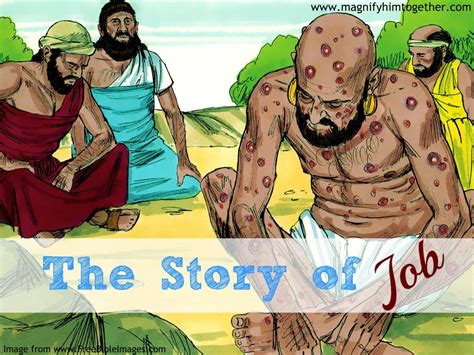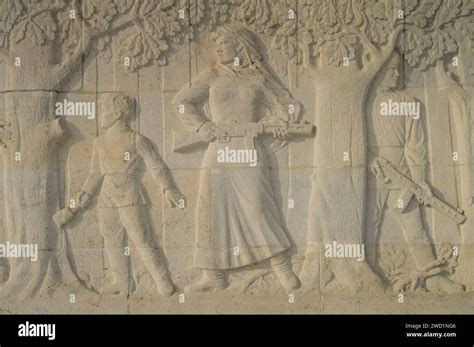Biblical Story Of Job

The biblical story of Job is a profound narrative found in the Book of Job, an integral part of the Old Testament. This story, often considered a literary masterpiece, delves into themes of faith, suffering, and the divine-human relationship. It explores the trials and tribulations faced by a righteous man, Job, and the complex dialogue that ensues between him, his friends, and God.
The narrative unfolds in a dramatic and thought-provoking manner, presenting a unique perspective on the nature of human existence and the role of faith in the face of adversity. Through its intricate exploration of theological and philosophical concepts, the Book of Job has captivated scholars, theologians, and readers for centuries, offering profound insights into the human condition and the mysteries of the divine.
Job’s Righteousness and Suffering

The story introduces us to Job, a man of impeccable integrity and unwavering faith. Job is described as “blameless and upright, one who feared God and turned away from evil” (Job 1:1). He is a wealthy man, blessed with a loving family, abundant livestock, and a prosperous life in the land of Uz.
However, the narrative takes a dramatic turn as God allows Satan to test Job's faith. In a celestial court, Satan suggests that Job's devotion is superficial, arguing that he only serves God because he has been blessed. God permits Satan to afflict Job, believing that his faith will remain steadfast. Thus, a series of devastating trials befall Job, testing the limits of his faith and resilience.
Job loses his entire fortune—his livestock, servants, and even his children, all in a single day. Overwhelmed by grief, he tears his clothes, shaves his head, and falls to the ground in worship. In a powerful display of devotion, he declares, "Naked I came from my mother's womb, and naked shall I return. The LORD gave, and the LORD has taken away; blessed be the name of the LORD" (Job 1:21-22). Despite his immense grief, Job remains faithful, refusing to curse God or question His ways.
The Dialogue with Friends and God

As Job endures his trials, three of his friends—Eliphaz, Bildad, and Zophar—visit him, intending to offer comfort and wisdom. However, their well-intentioned words become a source of contention. They suggest that Job’s suffering is a result of his hidden sins, a common theological perspective of the time. Job, though distressed, maintains his innocence and refuses to accept their interpretation.
The discourse between Job and his friends is a philosophical and theological debate. Job argues that his suffering is unjust and beyond his understanding, while his friends insist that his pain is a result of his sins, a common belief in their cultural context. This dialogue becomes a platform for exploring various perspectives on suffering, the nature of justice, and the relationship between God and humanity.
As the discourse intensifies, a fourth character, Elihu, enters the scene. Elihu, a young man, offers a unique perspective, suggesting that Job's suffering is a form of divine education, a way for God to draw Job closer to Him. Elihu's intervention adds a layer of complexity to the narrative, providing a bridge between Job's frustration and God's eventual response.
The Divine Response and Resolution
After a prolonged period of suffering and intense dialogue, God finally breaks His silence. In a powerful display of divine majesty, God speaks to Job from a whirlwind, asking a series of rhetorical questions that highlight the vastness and complexity of creation. God’s words are a reminder of His sovereignty and the limitations of human understanding.
Job, humbled by God's majestic revelation, realizes the depth of his ignorance and the futility of questioning God's ways. He declares, "I know that you can do all things, and that no purpose of yours can be thwarted" (Job 42:2). In this moment of profound realization, Job surrenders his questions and accepts the mystery of God's ways.
God, having heard Job's confession, restores his fortunes, blessing him with even greater prosperity than before. Job is given a new family, and his latter days are filled with contentment and joy. The story concludes with a powerful affirmation of faith, showcasing the resilience of the human spirit and the possibility of redemption even in the face of immense suffering.
Theological and Philosophical Insights
The Book of Job offers profound theological and philosophical insights. It challenges the notion of a simple cause-and-effect relationship between sin and suffering, presenting a more complex understanding of divine justice. The narrative suggests that suffering may serve a purpose beyond human comprehension, and that God’s ways are often mysterious and beyond our understanding.
Additionally, the story explores the tension between human wisdom and divine knowledge. Job's friends, though well-meaning, offer advice based on human understanding, which ultimately falls short in the face of God's divine wisdom. This highlights the limitations of human knowledge and the need for humility in the face of the divine.
The story of Job also delves into the nature of faith and its resilience. Job's unwavering devotion, even in the face of immense suffering and loss, is a testament to the power of faith. It showcases the possibility of maintaining trust in God, even when circumstances seem to contradict our expectations.
| Key Takeaways | Insights |
|---|---|
| The Nature of Suffering | Job's story challenges the simplistic view that suffering is always a result of sin. It presents a more nuanced understanding, suggesting that suffering may serve a divine purpose beyond human comprehension. |
| Divine Justice | The narrative questions the notion of retributive justice, highlighting the complexity of God's justice. It suggests that God's ways are often beyond human understanding, and that His justice may operate on a grander scale. |
| Faith and Resilience | Job's unwavering faith, even in the face of immense trials, is a powerful testament to the resilience of the human spirit. It showcases the possibility of maintaining trust in God, despite adversity. |

The Impact and Legacy
The Book of Job has had a profound impact on theological and philosophical thought. It has influenced various religious and literary traditions, shaping the way we understand suffering, faith, and the divine-human relationship. The story’s exploration of theodicy, the problem of evil, and the limitations of human understanding has sparked countless debates and discussions, enriching our understanding of these complex topics.
Throughout history, the story of Job has inspired countless works of art, literature, and theology. It has been a source of solace and inspiration for those facing adversity, reminding them of the resilience of the human spirit and the possibility of redemption. The narrative's enduring legacy is a testament to its timeless relevance and profound insights.
What is the significance of the Book of Job in the Bible?
+The Book of Job is significant as it provides a nuanced exploration of faith, suffering, and the divine-human relationship. It challenges simplistic views of justice and suffering, offering a more complex understanding of God’s ways. Its impact extends beyond religious contexts, influencing philosophical and literary thought.
How does the Book of Job explore the concept of suffering?
+The narrative challenges the notion that suffering is always a result of sin. It presents a more complex view, suggesting that suffering may serve a divine purpose beyond human comprehension. Job’s story showcases the resilience of faith and the possibility of redemption in the face of immense trials.
What is the role of Job’s friends in the narrative?
+Job’s friends, Eliphaz, Bildad, and Zophar, offer well-intentioned advice but ultimately fall short in their understanding of Job’s suffering. Their perspective, based on human wisdom, highlights the limitations of human knowledge and the need for humility in the face of divine wisdom.



